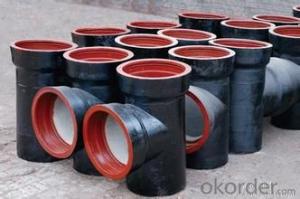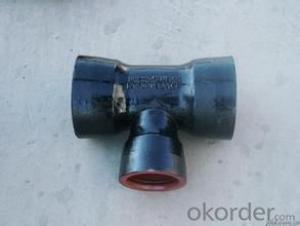DUCTILE IRON PIPE AND PIPE FITTINGS K9 CLASS DN100
- Loading Port:
- Tianjin
- Payment Terms:
- TT OR LC
- Min Order Qty:
- 20 pc
- Supply Capability:
- 3000 pc/month
OKorder Service Pledge
OKorder Financial Service
You Might Also Like
Material : Ductile Cast Iron
Size Range : DN 80mm to DN 2000mm
Unit Effective Length : 6m or 5.7m
Manufacture Standard: ISO 2531:1998/ EN 545:2006/EN 598:2007
Annual capacity : 200,000 tons
Coating Exterior: Zinc 130g/m2 according to ISO 8179-1 and bitumen coating 70 microns.
Cement Interior: Portland Cement/ High Alumina Cement/ Sulphate Resisting Cement Lining according to ISO 4179
Special requirements on external coating and internal lining can be applied
We also provide accessories such as SBR/EPDM rubber gaskets, lubricant paste, pipe caps, PE sleeves, etc.
Additional Parts:
Each pipe is strictly inspected according to related standard to ensure permanently high performance.
Easy Installation at site and service free for life
Long Service Lifespan
Quotation will arrive you within 24hours once we get your inquiry.
We guarantee offering you a competitive price.
A copy of original inspection reports of pipes will be offered after shipment.
Photos of loading process will be sent to the customer after shipment effect.
We will follow-up the delivery progress after shipment effect and update to the customer on weekly basis.
- Q:What are the different pressure classes available for ductile iron pipe?
- The different pressure classes available for ductile iron pipe include Class 100, Class 150, Class 200, Class 250, Class 300, Class 350, and Class 400.
- Q:Do ductile iron pipes require internal linings or coatings?
- Ductile iron pipes do not typically require internal linings or coatings. Ductile iron is known for its inherent corrosion resistance, which is primarily due to its composition and microstructure. The iron in ductile iron pipes is treated with magnesium, resulting in the formation of graphite nodules that give the material its ductile properties. This microstructure also provides a protective layer on the surface of the pipe, which helps to prevent corrosion. Additionally, ductile iron pipes have been used for several decades without the need for internal linings or coatings, proving their durability and resistance to corrosion. The smooth interior surface of ductile iron pipes also helps to minimize friction and maintain efficient flow rates. However, in certain cases where the conveyed fluid is highly corrosive or abrasive, or if the water quality is aggressive, internal linings or coatings may be recommended. These linings or coatings can be applied to protect the pipe from chemical attack or to prevent the leaching of iron into the water supply. Ultimately, the decision to use internal linings or coatings on ductile iron pipes depends on various factors such as the specific application, water quality, and local regulations. Consulting with professionals in the field, such as engineers or pipe manufacturers, can provide more tailored advice for specific scenarios.
- Q:Can ductile iron pipes be used for water distribution networks in rural areas?
- Yes, ductile iron pipes can be used for water distribution networks in rural areas. Ductile iron pipes are known for their high strength and durability, making them suitable for various applications, including water distribution. They have excellent resistance to external loads and pressure, making them ideal for underground installations. In rural areas where the water distribution network may be subjected to harsh environmental conditions or agricultural activities, ductile iron pipes can withstand external forces and resist corrosion better than other materials. They are also less prone to cracking or leaking, ensuring a reliable water supply for rural communities. Moreover, ductile iron pipes have a long service life, often exceeding 100 years. This makes them a cost-effective choice for rural water distribution networks, as they require minimal maintenance and replacement over time. However, it is important to consider other factors such as the availability of ductile iron pipes in the area, the cost of installation, and the technical expertise required for their installation and maintenance. Additionally, local regulations and standards should be followed to ensure compliance and safety. Overall, ductile iron pipes can be a suitable and reliable option for water distribution networks in rural areas, providing a long-lasting and efficient solution for delivering clean water to communities.
- Q:Are ductile iron pipes resistant to corrosion?
- Yes, ductile iron pipes are highly resistant to corrosion.
- Q:Can ductile iron pipe be used for both water and sewage applications?
- Ductile iron pipe is versatile and can be used for both water and sewage applications. It is known for its strength, durability, and corrosion resistance, making it suitable for various purposes. With its high tensile strength, it can withstand the pressure and heavy loads associated with water and sewage systems. Its smooth interior surface minimizes friction and enhances flow efficiency, making it perfect for transporting water and sewage. It also has excellent resistance to corrosion and chemical attack, ensuring a long lifespan even in harsh environments. Moreover, ductile iron pipe comes in various sizes and configurations, allowing for customization to meet specific water and sewage requirements. In conclusion, ductile iron pipe is a reliable and adaptable option for water and sewage conveyance.
- Q:Can ductile iron pipe be used for stormwater systems?
- Yes, ductile iron pipe can be used for stormwater systems. Ductile iron pipe is a strong and durable material that is commonly used for various applications, including stormwater systems. It has excellent corrosion resistance, making it suitable for handling stormwater, which often contains debris and chemicals. Ductile iron pipe also has high tensile strength and can withstand heavy loads and pressures, making it a reliable choice for stormwater systems that may experience significant flow rates and occasional surges. Additionally, ductile iron pipe is available in various sizes and configurations, allowing for flexibility and adaptability in designing stormwater systems.
- Q:What are the typical joint sealing requirements for ductile iron pipes under pressure?
- To ensure a secure connection without any leakage, ductile iron pipes under pressure typically require the use of gaskets and mechanical joints. Gaskets, commonly made of rubber or synthetic materials, are positioned between the pipe ends to establish a tight seal. These gaskets are designed to withstand the pressure of the fluid flow and prevent any leaks. They also provide flexibility to accommodate slight misalignment or pipe movement. Another commonly employed method for sealing ductile iron pipes is through mechanical joints, such as push-on joints or restrained joints. These joints securely hold the pipe ends together, eliminating the need for additional gaskets while providing a dependable seal. To guarantee effective joint sealing, proper installation techniques are crucial. This involves correctly aligning the pipes, appropriately tightening bolts or screws, and utilizing suitable lubricants or sealants. It's important to acknowledge that the specific joint sealing requirements for ductile iron pipes under pressure may differ based on the application, the type of fluid being transported, and the relevant industry standards or regulations. Therefore, consulting the manufacturer's guidelines and applicable codes is vital to determine the appropriate joint sealing requirements for a specific project.
- Q:What are the typical bedding and backfill requirements for ductile iron pipes?
- The typical bedding and backfill requirements for ductile iron pipes are important to ensure the proper installation and long-term performance of the pipes. Generally, the bedding material should be a granular material that provides support and uniform load distribution to the pipe. This can include materials such as sand, gravel, or crushed stone. The bedding material should be placed in a continuous and uniform layer along the bottom of the trench, with a minimum thickness of 6 inches. The width of the bedding layer should be at least 1.5 times the outside diameter of the pipe, or as specified by the pipe manufacturer. Backfill material is used to fill the remaining space around the pipe after the bedding is in place. The backfill material should also be a granular material, free from large stones, debris, or organic matter. It should be compacted in layers around the pipe, typically in 6-inch increments, using appropriate compaction equipment. The backfill should be placed evenly around the pipe, ensuring that there are no voids or gaps. It is important to avoid excessive compaction that could lead to damage or deformation of the pipe. The backfill material should extend above the top of the pipe to provide a minimum of 12 inches of cover. In addition to the bedding and backfill requirements, it is essential to follow any specific guidelines provided by the pipe manufacturer. These guidelines may include recommendations for specific materials, compaction methods, or additional protective measures. Overall, the proper bedding and backfilling of ductile iron pipes is crucial for maintaining the structural integrity and preventing damage or failure of the pipe system. Adhering to industry standards and manufacturer specifications ensures the longevity and performance of the pipes in various applications.
- Q:The difference between ductile iron pipe and steel pipe used in pipe jacking
- Comparison between ductile iron pipe and universal cast iron pipe: the process of making ductile iron pipe is cast by adding alkaline earth metal or rare metal such as magnesium and calcium in the raw material of common cast iron pipe.
- Q:Do ductile iron pipes have inner enamel?
- If the market supply is indeed difficult, can be done by the owners, Design Institute of supplier relationship; if the design institute requires it to provide products can persist in wilfully and arbitrarily, the available information (if the market can not supply, design a hair ah).
1. Manufacturer Overview |
|
|---|---|
| Location | |
| Year Established | |
| Annual Output Value | |
| Main Markets | |
| Company Certifications | |
2. Manufacturer Certificates |
|
|---|---|
| a) Certification Name | |
| Range | |
| Reference | |
| Validity Period | |
3. Manufacturer Capability |
|
|---|---|
| a)Trade Capacity | |
| Nearest Port | |
| Export Percentage | |
| No.of Employees in Trade Department | |
| Language Spoken: | |
| b)Factory Information | |
| Factory Size: | |
| No. of Production Lines | |
| Contract Manufacturing | |
| Product Price Range | |
Send your message to us
DUCTILE IRON PIPE AND PIPE FITTINGS K9 CLASS DN100
- Loading Port:
- Tianjin
- Payment Terms:
- TT OR LC
- Min Order Qty:
- 20 pc
- Supply Capability:
- 3000 pc/month
OKorder Service Pledge
OKorder Financial Service
Similar products
New products
Hot products
Related keywords


























